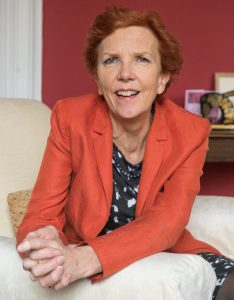It is 140 years this term since Somerville Hall opened its doors, with twelve students.
In a University as old as this one, 140 years is a relatively short time. But consider what progress women have made in that time. The battle for women’s suffrage in Britain was finally won through two Acts of Parliament in 1918 and 1928. It was not until 1919 that women were allowed to enter most professions. It was not until 1920 that women were allowed to matriculate at Oxford.
From Eleanor Rathbone (1893, Lit. Hum.), that bold campaigner for women’s suffrage, to Dorothy Hodgkin (1928, Chemistry), the first British woman to win a Nobel Prize for science, to Margaret Thatcher (1943, Chemistry) and Indira Gandhi (1937, Modern History), with their amazing firsts for women, the story of this College is intertwined with women’s history.
We have been part of that transformation which has seen women’s destinies change from their husbands’ helpers and homemakers to actors in their own right.
But there is more to do. The gender pay gap and the MeToo movement give us a few indications of the serious challenges we still face. And the UN’s Sustainable Development Goal 5 – achieving gender equality – remains a distant prospect in many parts of the world, and it is really fundamental that we achieve that.
The question we must ask ourselves now is this: where do we go in the next 140 years? What kind of Somerville does the world need now, and how can we play our part in achieving that? How can we build on our tradition of excellence and inclusivity?
By 2023, this University aspires to have a quarter of all students come from disadvantaged backgrounds and we will be playing a full part in university-wide access initiatives and will be maintaining our own efforts as a College to ensure we attract the best candidates from every walk of life.
It is, of course, totally unacceptable that, in 2019, some students still experience discrimination and imposter syndrome simply because of their race. While we always keep inclusion in the conversation here, actions speak louder than words. We are thrilled that Raj Tulsiani, the CEO of Green Park, has partnered with us and the History Faculty to create a new scholarship for a BAME postgraduate History student at the College, with the first scholar starting in October 2020.
And we are determined to act on climate change. Professor Renier Van Der Hoorn has agreed to be our Governing Body climate change champion and he will lead our efforts to make this a greener College. He will convene a working group made up of academic and non-academic staff and students.
An environmental audit will identify ways in which we can be more sustainable and reduce our carbon emissions. We are also adopting a sustainable food policy.
Above all else, we make our contribution to society through the work of our academics. So in the coming months and years, we plan to enhance support for our academic staff, making sure we continue to attract and retain the very best minds.
We will also take action to ensure that we are a responsible employer for all of our staff, with ongoing reviews of work practices to ensure that we have the appropriate resources available as well as identifying and acting on concerns.
The theme of the next few years will be building resilience. We want to make our students resilient so that they can thrive in an ever changing world, while providing them with an extraordinary education.
We ourselves must be resilient as an institution, meeting the challenges of climate change and safeguarding our tutorial system at a time of intense financial pressure. We must adapt to the needs of the 21st century, while not jettisoning the ethos and values that make Somerville unique.
Inclusion, diversity, radical reform, the courage to make a difference – these are all part of Somerville’s inheritance. We are the college of Cornelia Sorabji, Eleanor Rathbone, Vera Brittain, Dorothy Hodgkin and Margaret Thatcher.
And we are the College of many more women and men who have changed the world – in big and small ways, not just by leading countries or advancing science, but by providing leadership and advancement within their communities or families.
I hope – no, I expect – that in another 140 years, my successor will be writing to you and will have many more names to add to the roll-call of Somervillians who have left the world a better place than they found it.
So: here’s to another 140 years of achievement, and here’s to Somerville. Happy Birthday!
